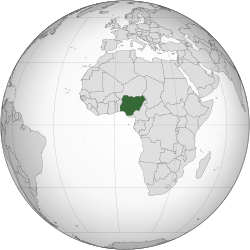Federal Republic of Nigeria | |||||||
|---|---|---|---|---|---|---|---|
| Motto: "Unity and Faith, Peace and Progress" | |||||||
| Anthem: "Nigeria, We Hail Thee" | |||||||
| Capital | Abuja 9°4′N7°29′E / 9.067°N 7.483°E | ||||||
| Largest city | Lagos | ||||||
| Official languages | English | ||||||
| National languages | |||||||
| Regional languages [1] | Over 525 languages [2] | ||||||
| Ethnic groups (2018) [3] | |||||||
| Demonym | Nigerian | ||||||
| Government | Federal presidential republic | ||||||
| Bola Tinubu | |||||||
| Kashim Shettima | |||||||
| Godswill Akpabio | |||||||
| Tajudeen Abbas | |||||||
| Kudirat Kekere-Ekun | |||||||
| Legislature | National Assembly | ||||||
| Senate | |||||||
| House of Representatives | |||||||
| Formation | |||||||
| 29 May 1999 | |||||||
| Area | |||||||
• Total | 923,769 km2 (356,669 sq mi)(31st) | ||||||
• Water (%) | 1.4 | ||||||
| Population | |||||||
• 2023 estimate | |||||||
• Density | 249.8/km2 (647.0/sq mi)(42nd) | ||||||
| GDP (PPP) | 2024 estimate | ||||||
• Total | |||||||
• Per capita | |||||||
| GDP (nominal) | 2024 estimate | ||||||
• Total | |||||||
• Per capita | |||||||
| Gini (2020) | medium inequality | ||||||
| HDI (2023) | medium (164th) | ||||||
| Currency | Naira (₦) (NGN) | ||||||
| Time zone | UTC+01:00 (WAT) | ||||||
| Date format | dd/mm/yyyy | ||||||
| Calling code | +234 | ||||||
| ISO 3166 code | NG | ||||||
| Internet TLD | .ng | ||||||
| |||||||
 |
|---|
The Fourth Republic is the current republican government of Nigeria. Since 1999, it has governed the country according to the fourth republican constitution. Nigeria adopted the constitution of the Fourth Republic on 29 May 1999. [8]



